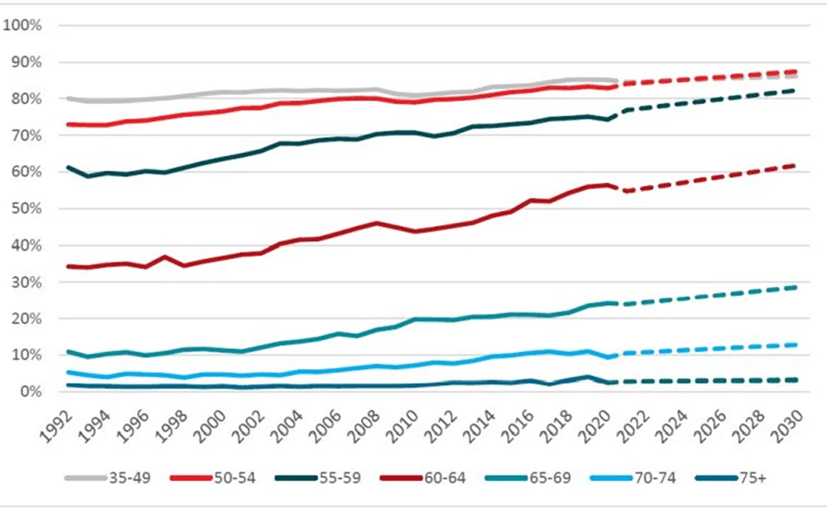Age is just a number: Proportion of over 50s in work set to hit record high 2030
A recent report shows that, in the last 20 years, the number of over 50s in work has increased by 36%. This has been driven by the volume of people in their sixties living and working for longer.
Indeed, a forecast suggests that, by 2030, the UK workforce will include 47% of all over 50s*
With a narrowing of retirement age due to changes in the State Pension and the demographic shift in the UK population and workforce, it means that pre-retirees are becoming relatively poorer, as those aged 50-64 hold 36% of the nation’s wealth, compared to 42% just a decade ago.
The volume of over 50s in work has increased from 31% in 1992 to 42% in 2020. While the percentage of working people under 50 has remained relatively consistent during this time, the over 50s group continues to grow.
This has therefore caused a narrowing of the gap in employment rates between the under and over 50s from 42 percentage points in 1992 to 35 percentage points in 2020, also with a narrowing to 29 percentage points expected by 2030.
A key driver in this trend is people continuing to work into their sixties, whose employment rate has risen almost twofold in the last two decades, with an increase from 23% to 41% since 1992.
Even with the option to leave the labour market upon State Pension Age, (currently age 66 for those close to retirement), many people are continuing to work past this.
Eight per cent of people 66+ currently are in work, putting in an average of 26 hours a week. According to the report’s forecasting, this number is also set to increase by 2030, to a record 11% – an estimated 948,000 people. Of course, this percentage may well increase if we see further changes to the State Pension Age in the next few years.
In recent times, there has also been a narrowing of the retirement age gender gap. While the average age of retirement entry has risen by 1.9 years for men (to 65) since 1992, the average at which women retire has increased by 3.6 years (to 64) as changes in the State Pension and the world of work have started to influence the decision to leave the workforce.
According to the survey completed for the report, people over 50 who are not yet retired ideally want/require an income of £23k a year when they do. Which is considered a moderate income for a single retired person.
It’s possible that one of the factors motivating the trend towards older people working for longer is a gradual shift in wealth. While over 50s as a group continue to hold the majority of UK wealth, in cash, property, pensions etc., the percentage has fallen in recent years for those aged 50-64, who have seen their share shrink from 42% in 2008-2010 to 36% just a decade later.
This shift may be influencing the number of older people in work, as they continue to try and bolster their finances in order to meet their desired retirement income.

Source: ONS. Cebr analysis
Graph: Employment rates of the over 50s with forecast from 2021, by subgroup
*from Legal & General Retail Retirement (LGRR) and the Centre for Economics and Business Research (Cebr)
If you are currently looking to employ global talent, or need support or advice in executing your Global Mobility strategy give us a call. We have years of experience in the field, and can fully support you at every stage of your Global talent management process.
Our immigration updates are for informational purposes only and are not a substitute for legal or scenario-specific advice. Furthermore, it is important to note that immigration announcements are subject to sudden and unexpected changes. If you have any further questions, or want more info about our services, please contact us on info@etesearch.com or call 01245 939188

